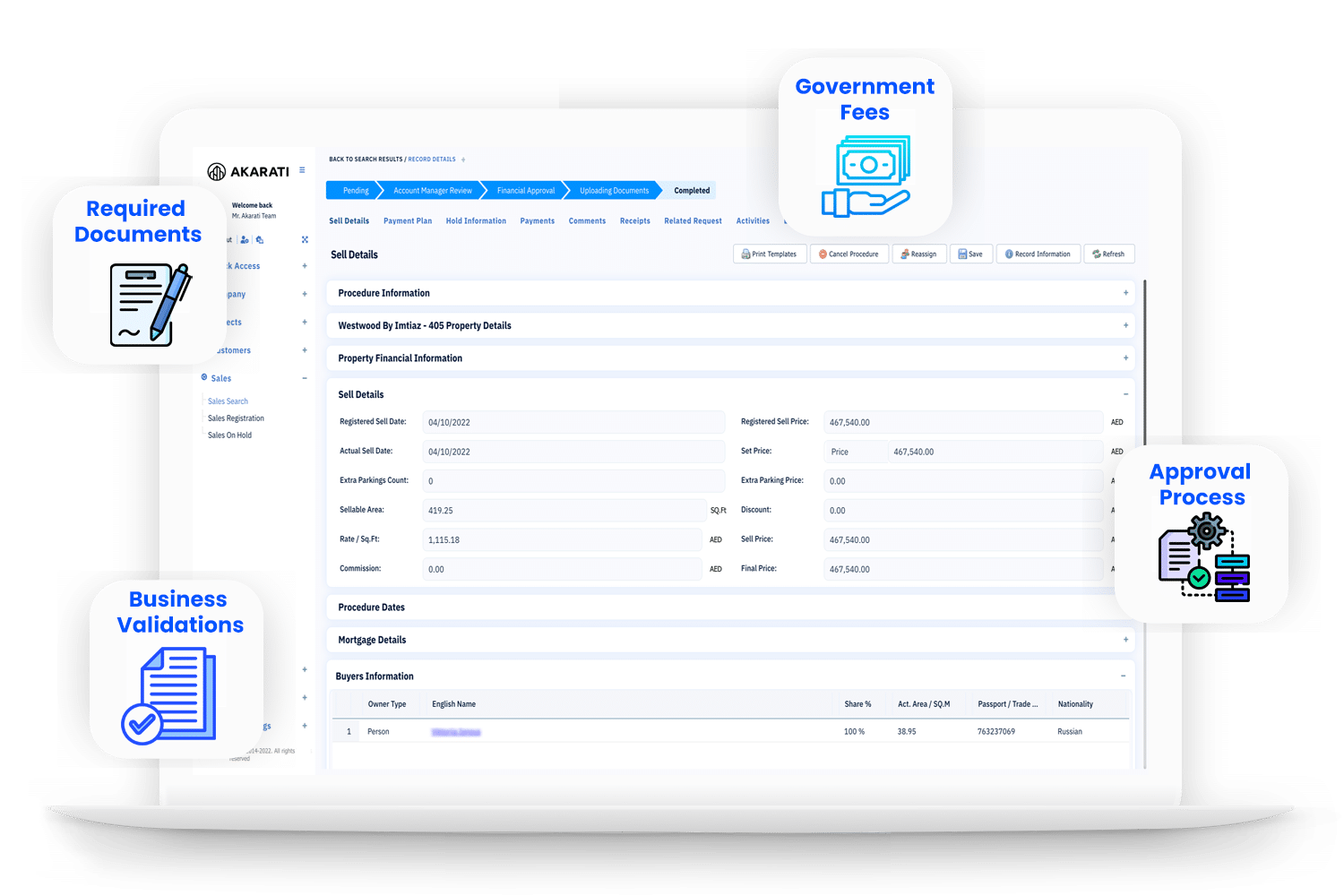Features
Unleashing Flexibility: Innovating Internal Processes with Real Estate Management
Enhancing Data Management for Real Estate Professionals
In the real estate industry, efficient data management is crucial for success. Real estate professionals deal with vast amounts of information, ranging from property listings and market trends to client details and transaction records. To effectively manage and leverage this data, real estate professionals are turning to advanced tools and technologies. By enhancing data management practices, professionals can gain valuable insights, streamline processes, and ultimately drive better business outcomes.
One of the primary challenges in real estate data management is the sheer volume of information that needs to be collected, organized, and analyzed. With numerous properties, clients, and transactions to track, manual data management becomes time-consuming and prone to errors. To overcome these challenges, real estate professionals are adopting innovative solutions such as Customer Relationship Management (CRM) software.
CRM systems designed specifically for real estate professionals provide a centralized database to store and manage client information, property details, and communication history. These systems offer features like contact management, lead tracking, task automation, and email integration, allowing professionals to streamline their workflows and stay organized. By leveraging a CRM, real estate professionals can effectively manage their client relationships, track leads, and access crucial property information with ease.
Another key aspect of data management in real estate is market analysis and trend tracking. Staying up to date with market conditions, pricing trends, and property values is essential for making informed decisions. Real estate professionals are increasingly relying on market data platforms that aggregate and analyze market information from various sources. These platforms provide comprehensive insights into market trends, property values, and competitor analysis, empowering professionals to make data-driven decisions regarding pricing, property acquisition, and marketing strategies.
Data visualization tools also play a vital role in enhancing data management for real estate professionals. These tools enable professionals to transform complex data sets into visual representations such as charts, graphs, and maps. With visualizations, professionals can quickly grasp and communicate insights, identify patterns, and present information in a compelling manner. Visualizations are particularly useful when analyzing property data, comparing market trends, and creating impactful marketing materials.
Data security is a paramount concern in the real estate industry, given the sensitive nature of client information and financial transactions. Real estate professionals must prioritize data security and adopt robust measures to protect against cyber threats and data breaches. Implementing secure cloud-based storage solutions, using encryption techniques, and regularly updating security protocols are essential steps for safeguarding data integrity and maintaining client trust.
Furthermore, integrating data management systems with other real estate tools and technologies can significantly enhance efficiency and productivity. For instance, integrating a CRM with online listing platforms enables real estate professionals to automatically synchronize property listings, streamline lead generation, and manage inquiries efficiently. Integration with accounting software simplifies financial management, tracking expenses, and generating accurate reports.
As real estate professionals increasingly rely on mobile devices for their day-to-day operations, mobile applications tailored for data management offer added convenience and flexibility. Mobile apps allow professionals to access and update client information, manage appointments, and collaborate with colleagues on the go. With mobile solutions, real estate professionals can stay connected, respond promptly to client needs, and stay productive, regardless of their physical location.
Improving Customer Relationship Management and Collaboration
In today’s highly competitive business landscape, building strong customer relationships and fostering effective collaboration within organizations are crucial for long-term success. To achieve these goals, businesses are increasingly turning to advanced Customer Relationship Management (CRM) tools and collaboration platforms. By improving customer relationship management and facilitating collaboration, businesses can enhance customer satisfaction, drive productivity, and foster innovation.
Customer Relationship Management (CRM) systems provide businesses with a centralized platform to manage and nurture their customer relationships. These tools enable businesses to store and organize customer data, track interactions, and analyze customer behavior. By leveraging CRM systems, businesses can gain a comprehensive understanding of their customers, allowing for personalized and targeted marketing efforts.
CRM systems offer a wide range of features to improve customer relationship management. These features include contact management, lead tracking, opportunity management, sales forecasting, and customer service ticketing. By streamlining these processes, businesses can effectively manage their customer interactions, ensure timely follow-ups, and provide exceptional customer service. CRM systems also provide real-time insights and analytics, enabling businesses to make data-driven decisions and identify opportunities for growth.
Effective collaboration within an organization is equally important for driving success. Collaboration platforms and tools enable teams to communicate, share information, and work together seamlessly. These platforms eliminate communication silos, promote transparency, and facilitate knowledge sharing. By fostering collaboration, businesses can harness the collective expertise of their teams, leading to innovative solutions and improved decision-making.
Collaboration platforms offer a wide range of features to enhance teamwork and productivity. These features include document sharing, task management, real-time messaging, video conferencing, and project tracking. With these tools, teams can collaborate on projects, share ideas, and exchange feedback in a centralized and accessible environment. Collaboration platforms also enable remote work and facilitate virtual team collaboration, allowing businesses to adapt to changing work dynamics and leverage global talent.
Integrating CRM systems with collaboration platforms can significantly enhance customer relationship management and collaboration within organizations. By combining these tools, businesses can ensure that customer data and interactions seamlessly flow between the CRM system and collaboration platform. This integration allows sales and customer service teams to access customer information, track sales activities, and collaborate effectively on customer-related tasks. It also enables teams to collaborate on marketing campaigns, share customer insights, and align their efforts towards achieving common goals.
Additionally, CRM and collaboration integration empowers businesses to gain a holistic view of their customer relationships. Sales and customer service teams can leverage collaboration platforms to share customer feedback, highlight potential upsell opportunities, and collaborate on resolving customer issues promptly. Marketing teams can collaborate with sales and customer service to develop targeted campaigns based on customer insights. The integration of CRM and collaboration platforms promotes cross-functional collaboration, breaking down departmental barriers and fostering a customer-centric approach across the organization.

What’s needed for efficient management of dubai real estate projects?
Specifically, for under-construction and off-plan projects that are affected by changing regulations.
Real estate projects management is a complex process that requires high attention to detail and in depth understanding of many areas of knowledge, especially for under construction or off-plan projects where governments and regulators are continually enforcing new rules.
As a minimal requirements for any real estate developer, managers have to know and understand a whole breath of processes starting from choosing efficient locations to build, appointing contractors, registering real estate projects, opening escrow accounts, use government systems such as OQOOD and TAS, marketing and selling properties, managing customers, sending payment reminders …. and the list goes on and on.
In simple words, its just too much information to handle and manage.
With such complexity and this level of details, many reputable software systems became very expensive and became difficult to use and most of the time they require massive efforts and expertise to implement.
Thats why we built Akarati Platform, a comprehensive, industry specific ERP solution on the cloud, which is deigned by highly experienced teams in all fields, operations, regulations, finance, project management and process re-engineering with almost two decades of experience in the real estate industry.
Akarati Platform is not only shipped with pre-defined processes for all management aspects but also it comes with all government compliance requirements.

Here an example for one workflow out of tens which included in Akarati
We’ll explain the journey from acquiring a lead of a new potential customer who is just showing an expression of interest, to their registration as an owner of a property in the OQOOD system.
We’ll also explain what is OQOOD Property Sales Pre-Registration, how it works, and the benefits of having the flexibility to create your own Sales Pre-Registration processes or you can just use what we have already pre-set for you based on our system smart analytics from hundreds of processes.
Additionally, I will introduce our innovative Real Estate Management Solution, which facilitates Property Pre-Sell Registration, and all the ways it can help you streamline the registration process for your clients.
Property Pre-Sell Registration is a process that enables developers to sell their properties before the whole sell processes fulfilled. This process involves registering interested buyers ahead of time, so that they can secure a spot in the development. By doing so, buyers can take advantage of early-bird pricing, choose the specific unit, and involve specific team members to follow with the whole process.
How Property Pre- Registration Works
1. The Property Pre- Registration process involves several steps. First, usually your internal team creates a registration request or checking the pending request, and in this step accesses on the whole related information you need from sell details, payment plans, receipts, activities, and more.
2. Once you moved to the next registration step such as reviewing you can pre-select which related information you need to have in front of you to can finish the reviewing task.
Also buyers receive access to exclusive information about the development, such as payment plans, pricing, and contracts.
4. Our Innovative Real Estate Management Solution for the Akrati’s flexibility to improve your management processes
Not Only the Authorities but also to ease the flexibility of the processes we have integrated with outlook, Call center, shipping companies, and banks.
Welcome to our news letters
Akarati is One ERP platform to replace them all.
subscribe to our newsletters to know how all of your work can be done in one place.
.
